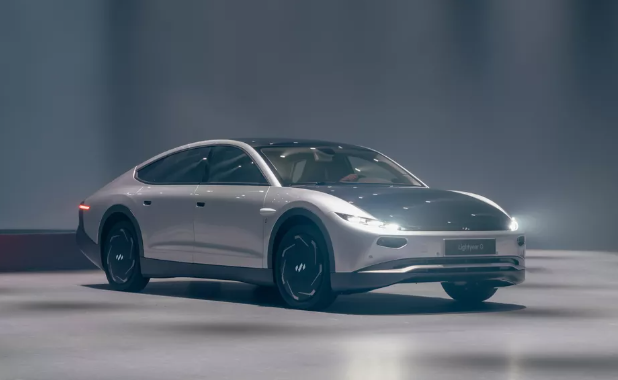Given the growing popularity of electric vehicles, as evidenced by EY’s latest Mobility Consumer Index report, solar-powered cars are not going to become more mainstream as technology advances. In the hands of Lightyear, a Dutch startup founded in 2016, all the ingenuity of solar power will no sooner be at hand as the company prepares for mass production of its Lightyear 0, a sedan. covered with solar panels that travels 388 miles in range.
The Lightyear solar-powered vehicle assembly includes approximately 53.8 square feet of solar panels, specifically referred to as “patented double-curve solar panels” via the team. These inclusions allow the solar car to gain power while sitting and driving in the middle of the sun. The technology lends credence to the ability to never need to stop for any form of refueling, as the startup posits that an average 21-mile ride could potentially fuel the ride for months, depending on the climate.
Lightyear adds almost nonchalantly: “In climates like the Netherlands it would be two months and, in Spain or Portugal, up to seven months.”
Related article: Check out Lightyear One: EV traveled 710 km on a single charge
The startup’s production-ready solar-powered vehicle uses a 60 kWh battery along with four electric motors with a claimed 10-second zero-to-62-mph dash potential. The Lightyear 0 will come with 1,269 lb-ft of torque in addition to 174 horsepower and a top speed of 100 mph. It will also have over-the-air software updates, similar to Tesla and other assorted electric vehicles, as well as phone-as-key capabilities, equipped with a central touchscreen that runs on the vehicle’s operating system. Google, Android Automotive.
Lightyear introduced a similar build in 2019, which at the time offered 450 miles of range on a prototype called Lightyear One. The automaker will later outline more details on the One iteration in late 2021, pricing the solar-powered vehicle at $34,000 to diversify Lightyear’s vehicle portfolio. According to the startup, its Lightyear 0 will cost a relatively affordable $263,262 (€250,000) and will only have 946 units made in its image.
Though at the forefront of solar-powered electric vehicle ingenuity, Lightyear isn’t the only company integrating solar technology into the automotive industry. Aptera is making huge strides in its own solar electric vehicle business, recently returning home with $40 million in crowdfunding to advance its line of so-called “autocycles,” which look more like rides from a future. cyberpunk of 2079 in Los Angeles. In addition, there is the German company Sono Motors, which not 24 hours before writing, announced 18,300 reservations for his Sion solar powered vehicle.
Lightyear, however, wants to stand out from the crowd by breaking the mould, as evidenced by the exorbitant asking price for the Lightyear 0. The startup not only has a fully dedicated manufacturing partner in the guise of Valmet Automotive and stays ahead -keeping the solar-powered EV effort with a full production schedule set in stone.
Read also : The Lightyear One EV is becoming one of the most efficient cars ever built
ⓒ 2021 TECHTIMES.com All rights reserved. Do not reproduce without permission.






More Stories
Delay in mass production of new Intel products is a boon for AMD, share of AMD x86 server processors expected to exceed 22% in 2023, according to TrendForce
Quantum industry milestone brings mass production of quantum chips closer
NEO Battery Materials provides updates on installation of additional equipment for mass production optimization and final stages of commercial plant design for construction